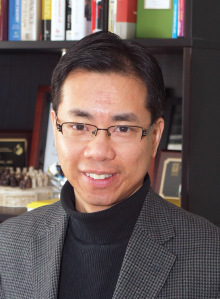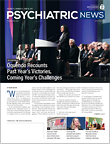“Culture is everywhere,” says psychiatrist Kenneth Fung, M.D.
For Fung, who is president-elect of the Society for the Study of Culture and Psychiatry, culture is key to a more thorough understanding of health and illness, of how people respond to being “sick” and of how clinicians approach recovery. He has brought a passion for the practice of cultural psychiatry to community activism, teaching, and clinical work.
In particular, Fung has sought to understand and challenge stigma about mental illness and treatment among the Asian communities of his hometown Toronto. He is a co-founder of the Asian Initiative in Mental Health Program (AIM) at the Toronto Western Hospital, which serves the local, underserved Cantonese- and Mandarin-speaking communities and is a training ground for medical students and residents interested in cross-cultural psychiatry.
Among other programs, AIM sponsors the Early Intervention in Psychosis Program, which is focused on members of the Chinese immigrant community in Toronto who experience a first episode of psychosis. In addition to his efforts to increase culturally competent mental health care through AIM, Fung provides psychiatric consultation and training for mental health care organizations for minorities.
For his work with AIM, Fung was one of three winners of the 2016 APA Foundation Awards for Advancing Minority Mental Health announced at the annual benefit of the American Psychiatric Association Foundation at APA’s 2016 Annual Meeting in Atlanta.
“Culture is all important in how people experience mental illness, and understanding the cultural barriers to seeking care among our immigrant populations is critical to addressing the inequities in access to care that exist in many North American communities,” said Ranna Parekh, M.D., director of APA’s Division of Diversity and Health Equity. “Kenneth Fung’s work in the Asian communities of Toronto is exemplary of the kind of good work that can be done when psychiatry is culturally informed and culturally sensitive.”
Cultural Perceptions Affect Care Seeking
As a Chinese Canadian who immigrated to Toronto at the age of 13, Fung has brought his personal experience to the understanding of culture, mental illness, and psychiatry.
“While I certainly experienced much less hardship than many immigrants, I did encounter personal experiences of racism, bullying, and difficulty with languages in school, and my parents struggled through acculturative challenges,” he told Psychiatric News. “When I sometimes ‘forgot’ that I was a minority when focused on fitting in, there were intermittent jarring reminders in the way of insults and bullying—from taunts about my accent or my last name to ‘Why don’t you go back home?’ ”
Early in training, Fung became aware of how cross-cultural illiteracy could blind even the most exemplary physicians. “I became keenly aware that many otherwise excellent psychiatrists are oblivious to the importance of cultural differences,” he said.
In 2000, he embarked on a fellowship in cultural psychiatry looking at alexithymia—the inability to express feelings—among Chinese Canadians.
“Sitting in a family doctor’s office in Chinatown, I had the opportunity to chat with patients while they were filling in my research inventory,” he recalled. “An elderly woman tearfully related to me her personal difficulties and depressive symptoms, while vowing to me that she would never burden her wonderful family doctor with these unimportant and irrelevant issues.”
Fung said that such barriers to care arising from alternative cultural ideas, lack of mental health understanding, and stigma are very real in the Chinese community. Maria Chiu, Ph.D., and colleagues reported in the August 2, 2016, Journal of Clinical Psychiatry that after adjusting for sociodemographic characteristics, immigration, and discharge status, Chinese patients had greater odds of being involuntarily hospitalized and exhibiting severe aggressive behaviors than the general population.
“It is likely that cultural perceptions of mental illness among these different ethnic communities and the commensurate delay in seeking help resulted in greater illness severity at time of hospitalization,” the researchers concluded.
Fung said, “We have known now for many years that among the immigrant Asian population, people are much less likely to get help in a timely way when they need it. They have vastly underutilized the mental health system in terms of their ratio to the overall population—not because they don’t experience the same problems, but because they wait until the situation is an emergency.”
Fung has devoted himself to a range of community activities aimed at decreasing stigma and improving access to care in immigrant communities. As clinical director at AIM, Fung oversees all clinical services and provides direct psychiatric consultations and treatment including outpatient psychotherapy and group therapy. He is also a psychiatric consultant to two other clinics serving Asian communities in Toronto.
As coordinator for the core curriculum for cultural psychiatry in the residency program at the University of Toronto, Fung aims to increase the level of cultural competence among the next generation of psychiatrists. And he has worked with local media to promote mental health awareness in the broader public; he helped create and co-chair “Mindfest,” an annual academic-community collaboration and festival celebrating mental health and illness awareness, to be held for the fifth consecutive year this October.
Fung is co-principal investigator for the Toronto site of “Strength in Unity: Men Speaking Out Against Stigma,” an anti-stigma intervention project among Asian communities in Canada. The aim of the project, funded by the Movember Foundation, is to mobilize youth and men from Asian communities in Toronto, Calgary, and Vancouver to become community mental health ambassadors and to address the stigma of mental illness in their communities.
Strength in Unity grew out of a previous project, “CHAMP: Community Champions HIV/AIDS Advocates Mobilization Project,” for which Fung was a co-principal investigator. The study engaged 66 ethno-racial leaders from the faith, media, and social justice sectors and people living with HIV in two stigma-reduction training programs: Acceptance Commitment Therapy Training and Social Justice Capacity Building. Participants were followed for a year, and data on changes in their attitudes and behaviors as well as their actual engagement in HIV prevention, support, and stigma reduction activities were collected.
CHAMP results showed that the interventions were effective in reducing HIV stigma and increasing participants’ readiness to take action toward positive social change.
Culture, Fung knows, is the air we breathe—for good and for ill—and often just as invisible. “When you are surrounded by your own culture, you don’t see it—which means you can’t see your own blind spots,” he said. “If we as psychiatrists don’t pay attention to culture and its impact on our patients, we won’t see our own blind spots when it comes to treating them.” ■

